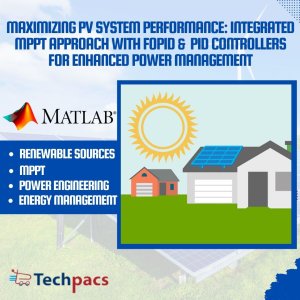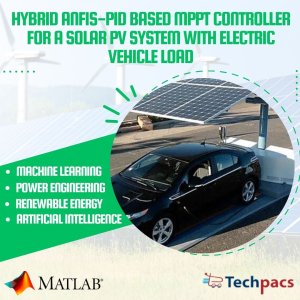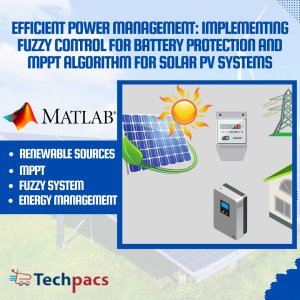Improving Solar PV System Efficiency with FOPID Controlled STATCOM & MPPT
Problem Definition
As solar power continues to play a larger role in the energy grid, ensuring the stability of grid voltage through effective reactive power compensation becomes paramount. The implementation of Static Synchronous Compensators (STATCOMs) has shown promise in addressing reactive power issues, but existing control strategies have highlighted limitations that hinder their optimal performance. Studies have identified issues with traditional PI-based control strategies, such as overshoot, oscillations, and inadequate transient response, which can lead to inefficiencies and potential instability within the system. Furthermore, the current constraints on solar power systems operating at maximum power output within specific limits pose additional challenges in maximizing the benefits of renewable energy integration. Therefore, there is a clear need to refine control strategies for STATCOMs to overcome these limitations and further enhance the reliability and efficiency of solar power integration into the grid.
Objective
The objective is to refine control strategies for Static Synchronous Compensators (STATCOMs) in solar PV systems by implementing a FOPID control strategy. This aims to address limitations of existing control strategies, improve grid voltage stability, enhance operational reliability, optimize power extraction from solar panels using MPPT, and maximize the utilization of solar energy for a more sustainable and efficient energy system.
Proposed Work
By implementing a FOPID control strategy for STATCOMs in solar PV systems, this research aims to address the current limitations of existing control strategies. The use of FOPID controllers offers enhanced performance, robustness, and stability in compensating for reactive power in the grid under solar systems. Additionally, by integrating the concept of MPPT into the control strategy, the research strives to optimize power extraction from solar PV panels, ensuring maximum power output regardless of environmental variations. This comprehensive approach not only improves grid voltage stability and operational reliability but also maximizes the utilization of solar energy, contributing to a more sustainable and efficient energy system. The rationale behind choosing FOPID and MPPT lies in their ability to capture complex system dynamics, provide superior control performance, and ensure optimal power extraction, making them ideal solutions for enhancing solar power systems' efficiency and reliability.
Application Area for Industry
This project can be applied across various industrial sectors that rely on solar power systems for their operations, such as the renewable energy industry, utilities, manufacturing, and commercial buildings. The proposed solutions, including implementing FOPID control strategy for STATCOMs and integrating MPPT for optimizing power extraction from solar PV panels, address specific challenges faced by these industries. By improving control performance, capturing complex system dynamics, and ensuring efficient power extraction, these solutions help enhance grid stability, voltage management, and overall operational efficiency. Industries can benefit from reduced system oscillations, better transient response, and increased power output, leading to reliable and stable grid operations, cost savings, and improved sustainability.
Application Area for Academics
The proposed project can significantly enrich academic research, education, and training by introducing a novel control strategy using Fractional Order Proportional Integral Derivative (FOPID) for Static Synchronous Compensators (STATCOMs) in solar PV systems. This approach offers an innovative solution to the existing challenges in reactive power compensation and power extraction from solar panels. Academically, this research can contribute to the advancement of control strategies in renewable energy systems, specifically in the context of solar power integration. By incorporating FOPID control and Maximum Power Point Tracking (MPPT) into STATCOMs, researchers can explore new possibilities for improving system performance, stability, and efficiency. In educational settings, this project can serve as a valuable learning resource for students and researchers interested in power systems, control theory, and renewable energy.
It provides a practical application of advanced control algorithms in real-world scenarios, offering hands-on experience with simulation tools and data analysis techniques. The relevance of this research extends to various technology and research domains, including power systems engineering, renewable energy, control theory, and data analysis. Field-specific researchers, MTech students, and PHD scholars can utilize the code and literature generated from this project to explore further experiments, simulations, and analytical studies in their respective areas of interest. In pursuing innovative research methods, simulations, and data analysis, this project opens up avenues for exploring the potential of FOPID control in enhancing the performance of solar PV systems. By addressing the limitations of traditional control strategies and optimizing power extraction, this research has implications for improving the overall efficiency and reliability of solar energy generation.
Reference Future Scope: Future research can focus on real-time implementation of the proposed control strategy in practical solar power systems to evaluate its performance under varying operating conditions. Additionally, exploring the integration of advanced machine learning techniques for predictive control and fault detection could further enhance the effectiveness of the proposed approach in ensuring grid stability and reliable operation.
Algorithms Used
The FOPID algorithm is used in this project as a novel control strategy for STATCOMs in solar PV systems. It provides improved control performance by capturing complex system dynamics and enhancing robustness, stability, and flexibility compared to traditional controllers. The P&O Method is integrated into the FOPID control strategy to optimize power extraction from solar PV panels by implementing Maximum Power Point Tracking (MPPT). This ensures that the solar system operates at its maximum power point regardless of environmental variations, leading to efficient utilization of solar energy. Overall, the combination of FOPID, P&O Method, and STATCOM algorithms contributes to achieving the project's objectives by enhancing accuracy, improving efficiency, and maximizing power extraction from solar PV systems.
Keywords
SEO-optimized keywords: reactive power compensation, solar PV systems, FOPID controller, STATCOM, Static Synchronous Compensator, power quality, voltage regulation, power electronics, renewable energy, solar power, grid integration, power system stability, power factor correction, harmonic mitigation, control system, energy management, smart grids, renewable energy integration, power system optimization, artificial intelligence, maximum power point tracking, MPPT, fractional order proportional integral derivative, solar energy, system dynamics, robustness, stability, transient response, overshoot, oscillations.
SEO Tags
Reactive power compensation, Solar PV systems, FOPID controller, STATCOM, Static Synchronous Compensator, Power quality, Voltage regulation, Power electronics, Renewable energy, Solar power, Grid integration, Power system stability, Power factor correction, Harmonic mitigation, Control system, Energy management, Smart grids, Renewable energy integration, Power system optimization, Artificial intelligence, Maximum Power Point Tracking, MPPT, Fractional Order Proportional Integral Derivative, Grid voltage stability, Solar power systems, Control strategies, PI-based control, Transient response, Power extraction, Maximum power output, Environmental variations, Efficient utilization, Solar energy, Research, Scholar, PhD, MTech student.
| Shipping Cost |
|
No reviews found!

















































No comments found for this product. Be the first to comment!